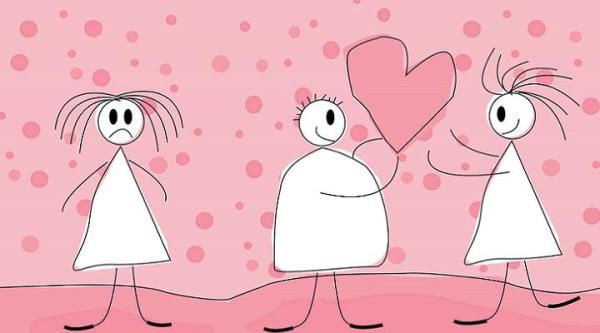A toxic relationship causes a lot of suffering. It is the bitterness of a relationship that produces loneliness. In this PsychologyFor article, we explain how to get out of a toxic relationship that makes you suffer, damages your self-esteem and leads you to a state of negativity. We also list what are the symptoms and causes of unhealthy love.
The best thing is to bet on healthy relationships in which the two people who love each other manage to be happier with each other, not unhappy.
Healthy love is incompatible with a toxic relationship
Love is not suffering This is the first step to take into account to avoid falling into the trap of a toxic relationship, that is, a type of relationship that takes more from you than it gives you and leads you to live in permanent tension.
The risk of this type of relationship is that it steals so much energy that the person ends up trapped in themselves and in that story. Therefore, by sharing less time with friends and family, you also lose objectivity to assess the situation you are suffering. This nuance is very important since a love of this type is not enjoyed, but rather one suffers from the negative effects it produces.
In this other article we discover how to heal a toxic relationship.

Why do you stay in a toxic relationship?
How to stop idealizing someone? There are some reasons why couples involved in toxic relationships cannot get rid of them:
- Romantic stereotypes of love that are unreal and that owe much of their legacy to the culture of romantic comedies where two people seem predestined to meet. In this culture of romanticism, loneliness can be perceived as disappointment in the face of the emotional dependence that is at the base of an unhealthy bond.
- Hope that something will change Hope is a feeling that can be positive in many contexts, but it is unhealthy when lived within a toxic love that leads the person to live waiting for the other to magically change.
- Low self-esteem One of the effects of a toxic relationship is that self-love is hurt and weakened.
- Fear There are many types of fear. For example, fear of loneliness, fear of what others will say, fear of change, etc. Fear of one’s own emotional fragility who experiences contradictory feelings in her situation.
In this other article we give you a series of tips so that you can learn to eliminate emotional dependence.
How do you know if a relationship is toxic?
If you ask how to know if a relationship is toxic, it is important that you learn to detect the symptoms of an unhealthy relationship. They are the following:
- You are incompatible , even if you try hard to pretend otherwise. Arguments are frequent in your relationship and your mental exhaustion is evident from this fact.
- You feel that your way of being has changed and your character since you are with your partner. That is, you feel like you are less “you” in this story, simply because you don’t feel free. It is as if you have been left without light and without inner brilliance. For example, your partner constantly corrects you or ridicules some of your opinions.
- There is some type of control For example, jealousy or control of the partner’s mobile phone (an invasion of another’s privacy that is totally unjustified).
- Criticize your family or friends A person who loves you well knows that the people who are part of your life are very important to you. On the contrary, in a toxic relationship it is common to despise certain ties between the couple based on negative criticism towards those people.
- Are not you happy And although you have tried to do your part to make the situation change, the relationship seems to follow the pattern of a vicious circle in which the same situations are repeated as if in an eternal return.
In this article you will find the answer to the following question: Why are we still in a toxic relationship?

How to leave a toxic relationship
Wondering how to leave a toxic relationship? Now we are going to tell you how to get out of a toxic relationship, giving you some essential tips that will help you make this decision:
- Break that trend towards isolation. It is very important that you share how you feel with your trusted friends and loved ones. They will accompany you at this moment.
- Don’t normalize the situation Remember what your expectations of happy love were and see where you are at. Without a doubt, you will be happier enjoying your solitude than in a relationship that makes you feel isolated.
- Don’t get caught solely by the words and promises of the other person. A person’s love is not only shown through the consistency of his words, but also through the consistency of his actions and his attitude towards you (and towards others). You can not only assess how your partner treats you, but also what his attitude is in his treatment towards other family members, for example.
- How to end a toxic relationship? Make your decision to break up and be firm. Think about yourself and your well-being. Take care of yourself. To do this, start by walking away from a relationship that is harming you. Assume the reality of unhappiness.
- If you think it is convenient, ask for professional help Psychological support can be therapeutic at a time like this. But, you can also seek other types of emotional support. For example, you can take a personal growth course on self-esteem. This is a great time to start loving yourself more and better.
- Try to think of What advice would you give? to a person who was going through your situation. This way, you can reflect on your life with greater distance.
- Don’t turn love into an excuse to stay there. Love cannot do everything. Therefore, even if you still have the feeling of feeling something special for that person, breaking up is the best thing that can happen to you.
This article is merely informative, at PsychologyFor we do not have the power to make a diagnosis or recommend a treatment. We invite you to go to a psychologist to treat your particular case.
If you want to read more articles similar to How to get out of a toxic relationship we recommend that you enter our Couples Therapy category.
Bibliography
- Allport, G. Personality Psychology, Edit. Paidós. Buenos Aires, Argentina, 1965
- Behrendt G. and A. Routola – Behrendt: If it’s broken, don’t fix it! Editorial Vergara, Barcelona, Spain, 2006.








